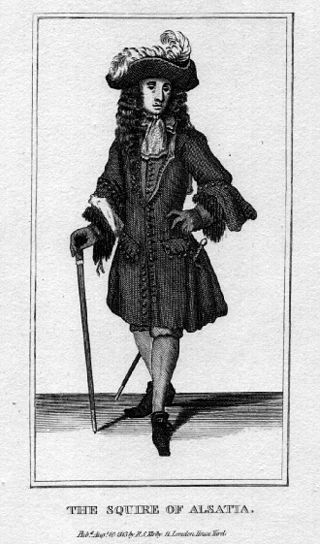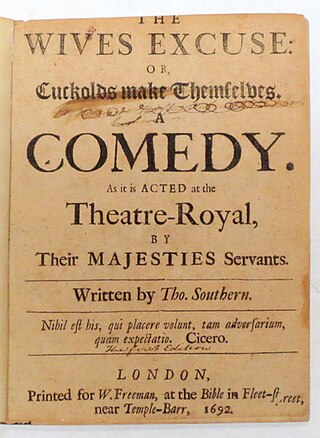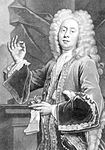Henry The Second, King Of England; With The Death Of Rosamond is a 1692 historical play often attributed to William Mountfort but possibly written by John Bancroft. It was first staged at the Theatre Royal, Drury Lane by the United Company. The prologue and epilogue were written by John Dryden. Some incidental music was composed by Henry Purcell.

The Squire of Alsatia is a 1688 comedy play by the English writer Thomas Shadwell. Alsatia was a nickname for the Whitefriars area of London, deriving from Alsace in northeastern France. A restoration comedy, it was performed at the Drury Lane Theatre by the United Company following on from John Crowne's Darius, King of Persia. One of the best-remembered roles, that of the shrewish Mrs. Termagant was first performed by Elizabeth Boutell. It was revived numerous times during the eighteenth century.
A Plot and No Plot is a 1697 comedy play by the English writer John Dennis.

The Married Beau or The Curious Impertinent is a 1694 comedy play by the English writer John Crowne. It is inspired by a passage from Miguel de Cervantes's Don Quixote. Incidental music was composed by Henry Purcell.
The Marriage-Hater Matched is a comedy play by the English writer Thomas D'Urfey. It was first staged by the United Company at the Theatre Royal, Drury Lane in January 1692. The original cast included John Bowman as Brainless, William Mountfort as Sir Philip Freewit, Samuel Sandford as Limber, John Hodgson as Darewell, Anthony Leigh as Myn Here Van Grin, George Bright as Bias, Thomas Doggett as Solon, William Bowen as Callow, Colley Cibber as Splutter, Elizabeth Barry as Lady Subtle, Katherine Corey as Lady Bumfiddle, Anne Bracegirdle as Phoebe, Charlotte Butler as La Pupsey and Abigail Lawson as Margery.
Sir Anthony Love; Or, The Rambling Lady is a 1690 comedy play by the Irish writer Thomas Southerne. It was originally staged by the United Company at the Theatre Royal, Drury Lane with a cast that included Susanna Mountfort in a breeches role as Sir Anthony Love, William Mountfort as Valentine, Joseph Williams as Ilford, William Bowen as Sir Gentle Golding, Anthony Leigh as An Abbe, John Hodgson as Count Canaile, Samuel Sandford as Count Verole, George Bright as Waitwell, Colley Cibber as Servant to Sir Gentle, Charlotte Butler as Floriante, Anne Bracegirdle as Charlote and Frances Maria Knight as Volante. The play's incidental music was composed by Henry Purcell.
Love For Money; Or, The Boarding School is a 1691 comedy play by the English writer Thomas D'Urfey. It was originally staged at the Theatre Royal, Drury Lane by the United Company. In 1733 it was adapted into a ballad opera The Boarding School by Charles Coffey.
A Commonwealth of Women is a 1685 comedy play by the English writer Thomas D'Urfey. Originally performed by the United Company as the Theatre Royal, Drury Lane, the cast included Joseph Williams as Captain Marine, Philip Griffin as Du Pier, Thomas Percival as Boldsprite, Thomas Jevon as Franvil, Anthony Leigh as Frugal, Joseph Haines as Hazard, Thomas Gillow as Don Sebastian, John Bowman as Nicusa, Henry Norris as La Mure, Joseph Harris as Bourcher, Katherine Corey as Roselia, Mary Lee as Clarinda, Margaret Osborne as Ariadne, Sarah Cooke as Aminta, Emily Price as Hippolita and Frances Maria Knight as Aglaura.

The Wives Excuse also The Wives Excuse; Or, Cuckolds Make Themselves is a 1691 comedy play by the Anglo-Irish writer Thomas Southerne. The title is sometimes written more grammatically as The Wives' Excuse.

Agnes de Castro is a 1695 tragedy by the English writer Catharine Trotter. Based on the novel of the same title by Aphra Behn, it was first staged by John Rich's company at the Theatre Royal, Drury Lane.
The Maid's Last Prayer: Or, Any Rather Than Fail is a 1693 comedy play by the Irish writer Thomas Southerne. It was first staged at the Theatre Royal, Drury Lane by the United Company.
The Massacre of Paris is a 1689 tragedy by the English writer Nathaniel Lee. It was first staged by the United Company at the Theatre Royal, Drury Lane. It is based around the 1572 St. Bartholomew's Day massacre which led the killing of many Huguenots during the French Wars of Religion. The events had previously been portrayed in Christopher Marlowe's Elizabethan play The Massacre at Paris.

Bury Fair is a 1689 comedy play by the English writer Thomas Shadwell. It is part of the tradition of Restoration Comedy that flourished during the era. It was first staged by the United Company at the Theatre Royal, Drury Lane in London.

Love Triumphant; Or, Nature Will Prevail is a 1694 tragicomedy by the English writer John Dryden. It was Dryden's final stage play.

Sir Barnaby Whigg; Or, No Wit Like A Womans is a 1681 comedy play by the English writer Thomas D'Urfey. It was first staged by the King's Company at the Theatre Royal, Drury Lane. A song for the play was composed by Henry Purcell.

Mithridates, King of Pontus is a 1678 tragedy by the English writer Nathaniel Lee. It was first performed at the Theatre Royal, Drury Lane in London by the King's Company. John Dryden wrote the play's epilogue.
Trick For Trick; Or, The Debauch'd Hypocrite is a 1678 comedy play by the English writer Thomas D'Urfey. It was first staged at the Theatre Royal, Drury Lane by the King's Company.

Love in a Wood; Or, St James's Park is a 1671 comedy play by the English writer William Wycherley. His debut play, it was first staged at the Theatre Royal, Drury Lane by the King's Company.

The Tragedy of Nero, Emperour of Rome is a 1674 tragedy by the English writer Nathaniel Lee. It was originally performed at the Theatre Royal, Drury Lane by the King's Company.

Cleomenes, the Spartan Hero or Cleomenes, The Spartan Heroe: A Tragedy is a 1692 tragedy by the English writer John Dryden. It was first staged at the Theatre Royal, Drury Lane by the United Company. It portrays the reign of Cleomenes, the King of Sparta, inspired by Plutarch's history of the period. Dryden's version is strongly Jacobite in drawing parallels from his overthrow to the recent Glorious Revolution in England. Because of this it was temporarily banned by the authority of Queen Mary.












